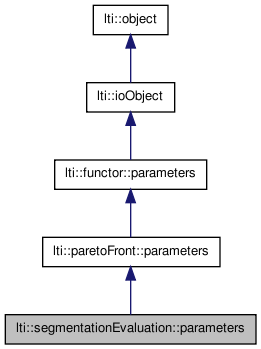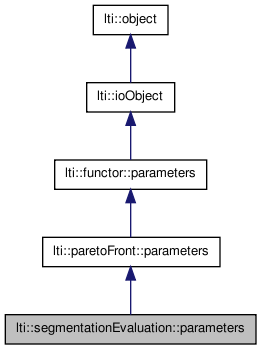

|
latest version v1.9 - last update 10 Apr 2010 |
|
The parameters for the class segmentationEvaluation. More...
#include <ltiSegmentationEvaluation.h>


Public Member Functions | |
| parameters () | |
| parameters (const parameters &other) | |
| ~parameters () | |
| const char * | getTypeName () const |
| parameters & | copy (const parameters &other) |
| parameters & | operator= (const parameters &other) |
| virtual functor::parameters * | clone () const |
| virtual bool | write (ioHandler &handler, const bool &complete=true) const |
| virtual bool | read (ioHandler &handler, const bool &complete=true) |
Public Attributes | |
| std::string | images |
| std::string | goldenPostfix |
| std::string | prevStagePostfix |
Fitness measures | |
Value containing the 1D fitness measures to be computed. The constants defined here are:
This sequence is important, since it determines the positions of the single measures in the fitness output vector. If more fitness measures are selected than the inherited parameter fitnessSpaceDimensionality, then the first ones in this sequence will be selected. If less fitness measure are selected than the inherited parameter fitnessSpaceDimensionality, then the rest of the vector will be filled with zeros. | |
| bool | numberOfRegions |
| bool | numRegionsReciprocal |
| bool | pixelWisePotentialAccuracy |
| bool | objectWisePotentialAccuracy |
| bool | regionWiseInformationContent |
| bool | throughput |
| bool | regionIntegrity |
| bool | pixelWiseCertainty |
Fitness parameterizations | |
| float | minValidRegionSize |
The parameters for the class segmentationEvaluation.
| lti::segmentationEvaluation::parameters::parameters | ( | ) |
Default constructor.
Reimplemented from lti::paretoFront::parameters.
| lti::segmentationEvaluation::parameters::parameters | ( | const parameters & | other | ) |
Copy constructor.
| other | the parameters object to be copied |
Reimplemented from lti::paretoFront::parameters.
| lti::segmentationEvaluation::parameters::~parameters | ( | ) | [virtual] |
Destructor.
Reimplemented from lti::paretoFront::parameters.
| virtual functor::parameters* lti::segmentationEvaluation::parameters::clone | ( | ) | const [virtual] |
Returns a pointer to a clone of the parameters.
Reimplemented from lti::paretoFront::parameters.
| parameters& lti::segmentationEvaluation::parameters::copy | ( | const parameters & | other | ) |
Copy the contents of a parameters object.
| other | the parameters object to be copied |
Reimplemented from lti::paretoFront::parameters.
| const char* lti::segmentationEvaluation::parameters::getTypeName | ( | ) | const [virtual] |
Returns name of this type.
Reimplemented from lti::paretoFront::parameters.
| parameters& lti::segmentationEvaluation::parameters::operator= | ( | const parameters & | other | ) |
Copy the contents of a parameters object.
| other | the parameters object to be copied |
Reimplemented from lti::paretoFront::parameters.
| virtual bool lti::segmentationEvaluation::parameters::read | ( | ioHandler & | handler, | |
| const bool & | complete = true | |||
| ) | [virtual] |
Read the parameters from the given ioHandler.
| handler | the ioHandler to be used | |
| complete | if true (the default) the enclosing begin/end will be also written, otherwise only the data block will be written. |
Reimplemented from lti::paretoFront::parameters.
| virtual bool lti::segmentationEvaluation::parameters::write | ( | ioHandler & | handler, | |
| const bool & | complete = true | |||
| ) | const [virtual] |
Write the parameters in the given ioHandler.
| handler | the ioHandler to be used | |
| complete | if true (the default) the enclosing begin/end will be also written, otherwise only the data block will be written. |
Reimplemented from lti::paretoFront::parameters.
Mask postfix.
For each image file in images, a manual segmented mask is required as "ground truth".
The filename of the masks will be assumed to be the same image name with the given postfix. For example, if an image is called "test.png" and the postfix is "-preseg", then the mask will be assumed to be "test-preseg.png".
Default value: "_premask"
| std::string lti::segmentationEvaluation::parameters::images |
Name of a file containing all images to be analyzed.
Default value: "images.txt"
Minimal size for valid region.
Percentage of the image size that defines the minimal size of a region to be considered in the statistics for region-wise information content and object-wise potential accuracy.
This value must be between 0 and 1.
Default: 0.0005 (i.e. 0.05%)
Total number of regiong detected per image.
This is usually a cost, and therefore you will never want to optimize the number of regions as if it were a fitness, but, in some applications, it may be necessary to search for the optimal "over-segmentations", which will therefore use this as fitness.
Default value: false
Reciprocal for the number of regions.
This is the inverse of the number of regions (1/number of regions). Usually you want the get the less possible number of regions that still don't merge different objects while partitioning an image.
This can be interpreted as the mean size of the regions normalized to the size of the image.
Default value: true
Object-wise potential accuracy.
Like pixel-wise potential accuracy but the contribution of each reference region is normalized to its size so that all regions in the reference segmentation are equally important.
Default value: false
Pixel-wise certainty.
This makes only sense for some segmentation functors, that can deliver the certainty with which a pixel was assigned to a label.
Default value: false
Pixel-wise potential accuracy.
Describes the percentange of the image pixels than can be optimally assigned to one of the ground-truth regions.
This can be interpreted as a measure inversely proportional to the degree of undersegmentation.
Default value: true
Previous Mask Postfix.
To save evaluation time, the test of higher-level algorithm can load the lower-level segmentations of the images in a file with this postfix and type lti (see lti::ltiFunctor), which is the only format that can save imatrices. For example, if an image is called "test.png" and the prevStagePostfix is "-ibs", then the mask will be assumed to be in "test-ibs.lti".
If no file is found with these names, then a low-level segmentation will be assumed, which does not require any previous masks.
Default value: "_ibs"
Region integrity.
Measures the number of regions mapped to a reference region. The function used punishes over- and under-segmentation.
Default value: false
Region-wise information content.
Proportion of the reference region covered by each single region.
Default value: false
Throughput.
Number of images segmented per second.
Default value: false